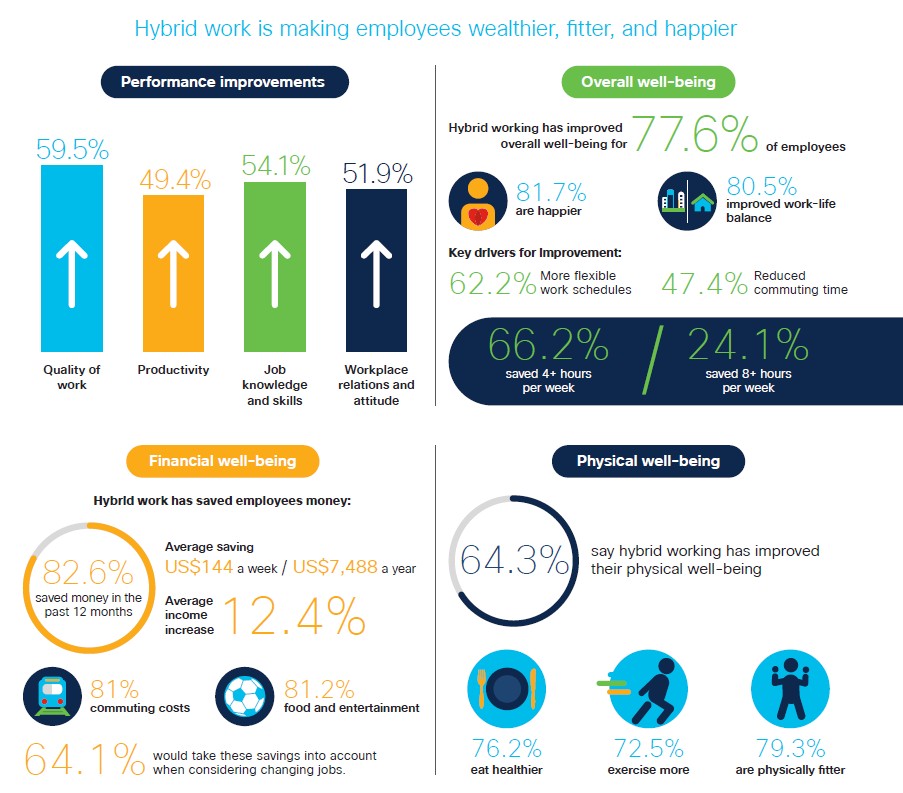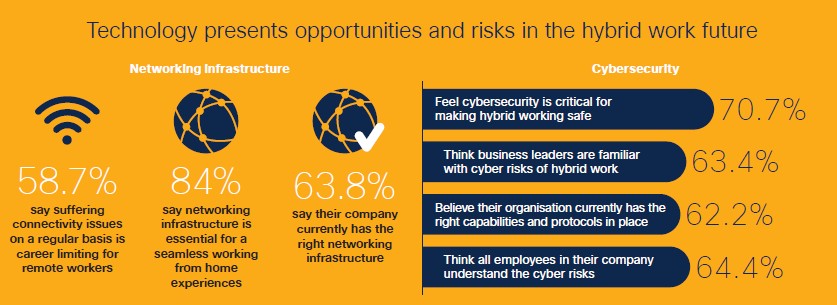The Cisco Global Hybrid Work Study 2022 says organisations that have adopted hybrid work have benefited from higher employee productivity levels, as a result of improved employee wellbeing and work-life balance.
Improved various aspects of employee wellbeing

78% of Hong Kong respondents say hybrid and remote working have improved various aspects of their wellbeing.
Time away from the office has improved work-life balance for 81% of Hong Kong employees. More flexible work schedules (62%) and significantly reduced or completely removed commuting times (47%) contributed to this improvement.
66% of people saved at least four hours per week when they worked from home, and 24% of respondents saved eight or more hours a week.
Hybrid and remote working have also enhanced social wellbeing, with 72% indicating that remote working has improved family relationships and 50% of respondents reporting strengthened relationships with friends.
Financial benefits
83% of Hong Kong respondents felt that their financial well-being improved because they could save money while working remotely. The average saving has been a little over HK$1,100 (US$144) per week, which works out to approximately HK$58,400 (US$7,488) a year.
81% of respondents ranked savings on both food and entertainment and commuting (81%) among their top areas for savings. These expense reductions contributed to retain talent as 64% of respondents say they would take these savings into account when considering changing jobs.
64% of Hong Kong respondents believe their physical fitness has improved with remote working. 73% exercise more when they work remotely. 76% say hybrid working has positively impacted their eating habits.
Given the improvement in various aspects of wellbeing, 82% of Hong Kong employees say the ability to work from anywhere has made them happier. About 45% report that hybrid working has helped decrease their stress levels. 24% find hybrid working more relaxing and the working environment less pressurized, while 33% of employees attribute the decreased stress to the greater flexibility offered by hybrid work arrangements.
Preparing for a hybrid working future

“The successful implementation of hybrid work involves flexibility and willingness of listening to employees about how they want to work. With the evident benefits of hybrid working, our study shows that a majority at 81% want a combination of a remote and in-office hybrid working model in the future,” said Wilson Ching, general manager, Cisco Hong Kong & Macau.
He added that recognising that the future work is hybrid, and it is the key to retain talent, there’s a lot of work companies need to do on the front to adapt it.
“Leaders must acknowledge that a point of no return has been reached and there must be deeper and more concerted investments in technology and workplace policies to enable your teams to work from anywhere and help your organisation to thrive in the new hybrid working future,” he continued.
Learnings from hybrid work
There is uncertainty over how different work styles might impact inclusion and engagement. Hong Kong respondents say that those who work fully remotely will have challenges engaging with their colleagues (56%) and company (53%), compared to those who toggle between remote and in-office work.
The research suggests that trust will be a critical element for organisations to manage – while 59% of respondents believe their manager trusts them to be productive when working remotely and a similar number (54%) believe their colleagues can be trusted to work remotely.

These findings underscore the need for an inclusive culture to be at the forefront of the hybrid working future. 66% of Hong Kong respondents say their company needs to rethink its culture and mindset to make hybrid work truly inclusive.
Technology will remain critical to enabling a future with increasingly diverse and distributed workforces. About 59% of Hong Kong respondents believe having connectivity issues regularly is career-limiting for remote workers.
As a result, 84% say networking infrastructure is essential for a seamless working from home experience, but only 64% say their company currently has the right networking infrastructure.

71% also believe that cybersecurity is critical for making hybrid working safe, but only 62% say their organisation currently has the right capabilities and protocols in place. Only 64% think that all employees across their company understand the cyber risks involved with hybrid work, and 63% think business leaders are familiar with the risks.
"It is clear that hybrid working is here to stay, and for good reason as employees and businesses alike see tangible benefits across key indicators – from improved overall employee wellbeing to better productivity and work performance," said Anupam Trehan, people & communities leader, senior director, people & communities, Cisco APJC.
He cautioned that more needs to be done to fully leverage the opportunities of a hybrid work future, particularly in building an inclusive culture, devising employee engagement strategies, and deploying technology infrastructure to bring organisations to the readiness levels of their employees.




